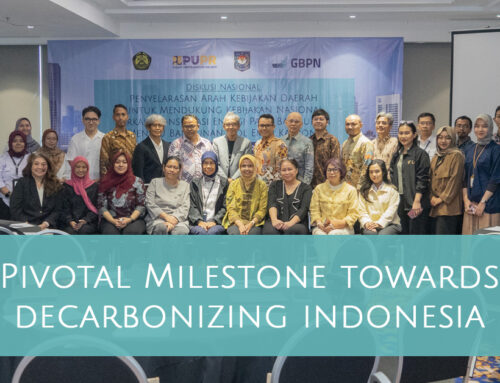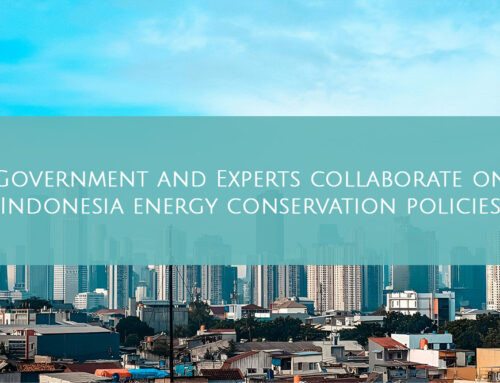Progress on regional support for national net zero goals
GBPN has supported a historic policy win in two Indonesian cities, with Tangerang Selatan City and Balikpapan City taking several significant leaps towards net zero. Following the formulation of their five-year action plans, these cities have adopted the recommendations and also integrated them into their long-term subnational strategic documents for the next 20 years. And for the first time in history, buildings have been incorporated into action plans that are ready to be implemented in both cities.
The plans outline a reduction potential of 405,000 MT carbon emission Balikpapan City and 205,000 MT in South Tangerang City until 2030 with cost savings in electricity of USD 43 million in Balikpapan and USD 26.5 million in Tangerang Selatan.

This significant achievement in Balikpapan and South Tangerang was commended by both the Ministry of Public Works and Housing and the Ministry of Energy and Mineral Resources, which cited their commitment to building sustainability. The final steps of this engagement served as a platform to present action plans and to engage in high-level discussions with key ministries. Representatives from these ministries provided insights on the alignment of the initiatives with the national decarbonization agenda, offering guidance and support for the implementation.
Collaborating closely with GBPN and key stakeholders, both cities have pioneered the development and implementation of targeted initiatives tailored to their unique contexts. Spokespeople from Balikpapan and Tangerang Selatan city governments said this achievement to not only underscored their commitment to environmental stewardship but also set a precedent for other cities across Indonesia to follow.
 Tommy Alfianto, with Balikpapan Regional Development Planning Agency, coordinated key stakeholders to ensure these action plans are applied and monitored for the next five years.
Tommy Alfianto, with Balikpapan Regional Development Planning Agency, coordinated key stakeholders to ensure these action plans are applied and monitored for the next five years.
“In line with our commitment to environmental sustainability, Balikpapan City is making significant strides towards reducing emissions in the buildings sector.” Mr Alfianto said
“What is interesting about our engagement with GBPN, is that we have gathered key government stakeholders, experts, academics, and social organizations to actively collaborate in the action plans development, as well as increasing the knowledge and know-how for emission reduction through focus group discussion and capacity building sessions.
“We have leveraged the strong coordination and collaboration between stakeholders and baseline data in energy consumption to set implementable actions such as incentives for constructing sustainable buildings in Balikpapan. Through targeted initiatives and collaborative efforts, we are confident in our ability to achieve meaningful emission reductions.” 
Eki Herdiana, Head of South Tangerang Regional Development Planning Agency highlighted the city’s collaboration with GBPN for the past year to develop the action plan.
“When we think of the word “collaboration” it may seem easy to say or to write on paper, but usually for regional governments it is a challenging step in implementation.” Mr Herdiana said.
“But thankfully, in this effort of building sector decarbonization, we can do it successfully with key stakeholders such as developers, experts, and government agencies. We are ready to implement this action plan and increase our capacity.
“This action plan outlines a 30% – 50% potential energy savings from various building categories in South Tangerang through improving designs, constructions and better building operations.”
 Senior Executive Advisor for GBPN Indonesia, Sandra Pranoto, highlighted the scalability of learnings from Balikpapan and Tangerang Selatan.
Senior Executive Advisor for GBPN Indonesia, Sandra Pranoto, highlighted the scalability of learnings from Balikpapan and Tangerang Selatan.
“Our engagement with 11 cities has identified an opportunity of emission reduction standardization across national and subnational levels, in which now both local and national governments are actively collaborating to address this room of improvement, facilitating coordination between local governments and building managers to ensure alignment with national goals.” Ms Pranoto said.
“By highlighting these case studies from Balikpapan and Tangerang Selatan who have developed their action plans, we illustrate implementations to align with existing national strategies and the amount of potential emission reductions.
“Through a bottom-up approach in researching baseline energy consumption and engagement with expert local partners. This model of engagement can be replicated and adapted to other cities in Indonesia.”
The success of these action plans in both cities was collaborated by the ministerial government, several regional government agencies, developers and experts.
South Tangerang
|
Balikpapan
|
Share This Story, Choose Your Platform!
Stay in touch with how we’re transforming the buildings sector
GBPN runs innovative building policy reform programs in key regions around the world that aim to tackle the climate emergency by decarbonising the buildings sector. Stay up to date with our newsletter.
Stay in touch with how we’re transforming the buildings sector
GBPN runs innovative building policy reform programs in key regions around the world that aim to tackle the climate emergency by decarbonising the buildings sector. Stay up to date with our newsletter.







